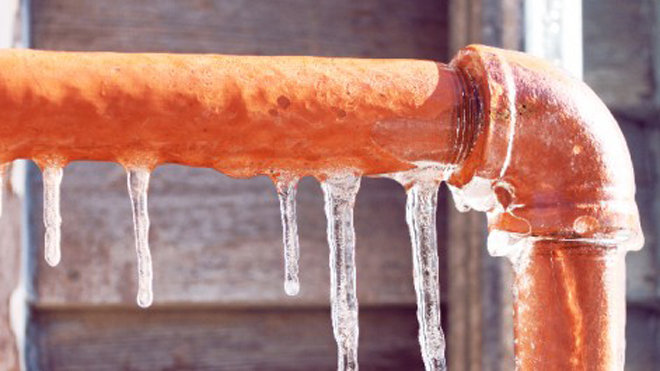Important Advice for Avoiding Frozen Pipes in Winter Seasons
Important Advice for Avoiding Frozen Pipes in Winter Seasons
Blog Article
Any individual seems to have their personal thinking with regards to Helpful Tips to Prevent Frozen Pipes this Winter.

Winter can damage your pipes, particularly by freezing pipes. Right here's exactly how to avoid it from taking place and what to do if it does.
Intro
As temperature levels decline, the threat of frozen pipelines rises, possibly bring about pricey repairs and water damages. Comprehending just how to avoid icy pipes is vital for property owners in cool climates.
Avoidance Tips
Insulating prone pipes
Wrap pipelines in insulation sleeves or use warm tape to shield them from freezing temperatures. Focus on pipelines in unheated or external areas of the home.
Heating strategies
Maintain indoor rooms properly warmed, especially locations with plumbing. Open up cabinet doors to permit cozy air to circulate around pipelines under sinks.
Just how to identify frozen pipes
Try to find lowered water circulation from faucets, unusual odors or sounds from pipes, and visible frost on revealed pipes.
Long-Term Solutions
Structural adjustments
Consider rerouting pipes far from exterior walls or unheated locations. Add extra insulation to attic rooms, cellars, and crawl spaces.
Updating insulation
Buy top quality insulation for pipes, attic rooms, and wall surfaces. Proper insulation aids maintain consistent temperature levels and lowers the threat of frozen pipelines.
Safeguarding Outdoor Plumbing
Yard pipes and outdoor taps
Detach and drain yard hose pipes before winter. Mount frost-proof spigots or cover exterior faucets with shielded caps.
Comprehending Icy Pipelines
What causes pipes to ice up?
Pipelines ice up when revealed to temperatures below 32 ° F (0 ° C) for prolonged periods. As water inside the pipes freezes, it broadens, putting pressure on the pipeline walls and possibly creating them to burst.
Dangers and problems
Icy pipelines can cause water supply interruptions, home damages, and expensive repairs. Ruptured pipes can flood homes and cause comprehensive structural damages.
Indicators of Frozen Pipeline
Identifying icy pipes early can stop them from rupturing.
What to Do If Your Pipes Freeze
Immediate activities to take
If you believe icy pipelines, maintain taps available to relieve pressure as the ice thaws. Use a hairdryer or towels soaked in hot water to thaw pipes gradually.
Verdict
Protecting against frozen pipes requires proactive measures and quick actions. By recognizing the reasons, indications, and preventive measures, house owners can safeguard their pipes throughout cold weather.
6 Proven Ways to Prevent Frozen Pipes and Protect Your Home
Disconnect and Drain Garden Hoses
Before winter arrives, start by disconnecting your garden hoses and draining any remaining water. Close the shut-off valves that supply outdoor hose bibs and leave the outdoor faucet open to allow any residual water to drain. For extra protection, consider using faucet covers throughout the colder months. It’s also important to drain water from any sprinkler supply lines following the manufacturer’s directions.
Insulate Exposed Pipes
Insulating your pipes is an effective way to prevent freezing. Pipe insulation is readily available at home improvement stores and is relatively inexpensive. Pay close attention to pipes in unheated areas such as the attic, basement, crawl spaces, or garage. Apply foam insulation generously to create a buffer against the cold. You can also wrap your pipes in heat tape or thermostat-controlled heat cables for added warmth.
Seal Air Leaks
Inspect your home for any cracks or openings that could let in cold air. Seal any holes around the piping in interior or exterior walls, as well as the sill plates where your home rests on its foundation. Additionally, make sure to keep your garage door closed unless you’re entering or exiting. Leaving it open creates a significant air leak that can lead to frozen pipes.
Allow Warm Air Circulation
During cold snaps, it’s essential to allow warm air to circulate evenly throughout your home. Leave interior doors ajar to promote better airflow. Open kitchen and bathroom cabinets to help distribute heat consistently around the rooms. If you have small children or pets, be sure to remove any household chemicals or potentially harmful cleaners from open cabinets for safety.
Let Faucets Drip
A small trickle of water can make a big difference in preventing ice formation inside your pipes. When temperatures drop significantly, start a drip of water from all faucets served by exposed pipes. This continuous flow helps prevent the water from freezing. Additionally, running a few faucets slightly can relieve pressure inside the pipes, reducing the chances of a rupture if the water inside does freeze.
https://choateshvac.com/6-proven-ways-to-prevent-frozen-pipes-and-protect-your-home/
:strip_icc()/snow-outdoor-faucet-pipes-4af65d1e5e904fb1aa7bf74071fe5d89.jpg)
I'm very enthusiastic about Helpful Tips to Prevent Frozen Pipes this Winter and I really hope you appreciated the new article. Do you know someone else who is in the market for the niche? Take a moment to promote it. Thank you for being here. Return soon.
This Post Report this page